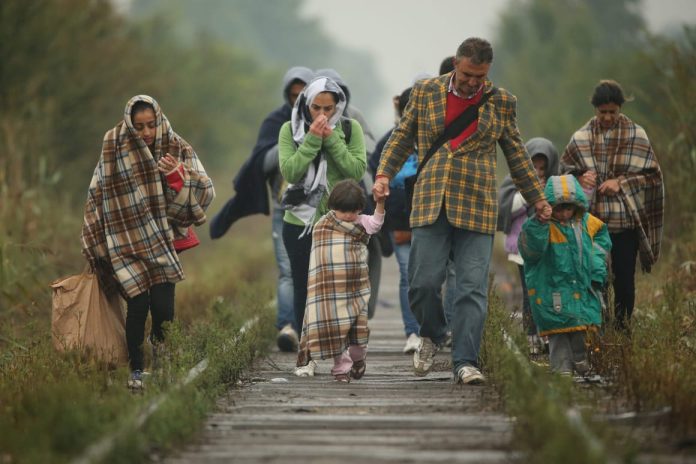President-elect Donald Trump recently stirred the world again by confirming his intention to declare a state of emergency to combat illegal migration. Democrats are urgently developing a plan to block such initiatives of the future head of state at both federal and regional levels, while human rights organisations warn that Trump’s new presidential term for migrants “will be much worse than the first four years” and the measures he is preparing “will be much more draconian.”
What is surprising, however: Europe, which angrily criticised Trump eight years ago for taking more modest steps to curb migration, is reacting much more calmly and quietly this time around. The Times’ foreign policy columnist Roger Boyes explains it simply:
“Trumpism has normalised in Europe… Whatever the differences between Trump and Europe, there may be some semblance of communication on the core immigration issues in his sequel. The often exaggerated outrage at Trump’s initial bombast and his supposed contempt for migrants has given way to a sense that there are common problems that require at least a civilised exchange of views.”
The current geopolitical situation shows that Europe has changed a lot in the eight years since Trump’s first victory. Back then, any initiatives to restrict migration, and even more so to expel illegal immigrants, were immediately met with hostility, and those who expressed such ideas were instantly labelled as “fascist,” “radical right,” “extremist,” or “marginal.” Now this policy has become quite official in the programmes of a number of European governments or leading parties in ruling coalitions.
Rwanda’s controversial plan
Trump’s “first coming,” despite the fact that his migration policy was universally condemned by the entire European Union, was like pushing the first of the dominoes whose fall later reached Europe. Boris Johnson, an admirer of the president-elect and former British PM, spawned an insane plan to expel migrants to faraway Rwanda, at a cost of £900 million from Britain’s budget. Camps had already been built in Rwanda to receive the migrants. Not only that, but they were already partially occupied – not by illegal immigrants, but by locals who had taken a fancy to the empty premises.
Numerous courts blocked the Rwanda plan, and this year Britain’s new Prime Minister, Keir Starmer, solemnly abandoned it in his first speech as head of government. By that time, however, a similar but more realistic project to expel illegal immigrants abroad had been taken up by Italian Prime Minister Giorgia Meloni, who had reached an agreement with the Albanian government. And it is worth noting: this time the idea was warmly supported by the head of the European Commission Ursula von der Leyen, who directly called on European leaders to use the deal between Rome and Tirana as an “exemplary model” and no one called her a fascist for this.
Italy mistakes in Albania
Nevertheless, Meloni’s plan is also failing at this stage. All 24 illegal migrants recently sent to Albania, after spending no more than 48 hours in the centres specially built for them, have been sent back by Italian courts. But the process of copying this practice seems to be unstoppable: the Dutch government is making arrangements to send illegal migrants to Uganda, Denmark has already built a camp in Kosovo to receive hundreds of expelled migrants.
And even Germany, a former symbol of the “open door policy,” has recently concluded an agreement with Uzbekistan to ensure “non-bureaucratic procedures,” as Chancellor Olaf Scholz put it, to “ensure that those who need to return, have to return.” The list goes on. It is now harder to name a country in Europe that is not trying to come up with a similar scheme.
POLITICO, which has consistently criticised Trump and his migration policies, is forced to admit:
“From Hungarian strongman Viktor Orbán to Denmark’s socialist Prime Minister Mette Frederiksen, Europe’s leaders have one thing in common — an urge to clamp down on migration.”
This is why we are now witnessing a phenomenon that seemed unthinkable during Donald Trump’s first term: the tacit endorsement of his migration policy by liberal Europe! All this pathos about human rights, about shared liberal values, about freedoms, has been cast aside.”
Against the backdrop of actually building concentration camps to keep migrants away from the “flowering garden,” it is no longer a matter of condemning Trump. On the contrary, Europeans are now humbly waiting to see how his fight against illegal migration will end, and are ready to adopt this experience if it proves successful.
THE ARTICLE IS THE AUTHOR’S SPECULATION AND DOES NOT CLAIM TO BE TRUE. ALL INFORMATION IS TAKEN FROM OPEN SOURCES. THE AUTHOR DOES NOT IMPOSE ANY SUBJECTIVE CONCLUSIONS.
Albert Martin for Head-Post.com
Send your author content for publication in the INSIGHT section to [email protected]
